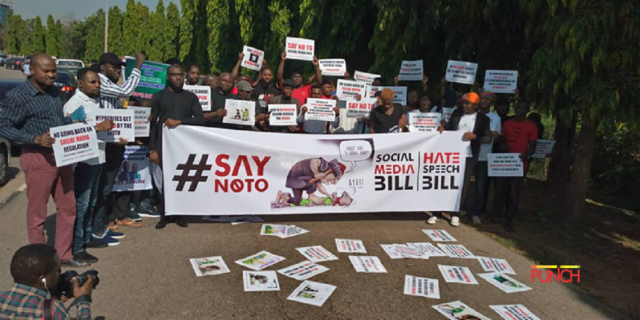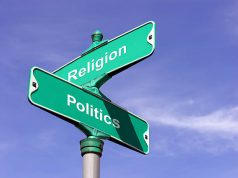Free speech has in recent times been under attack in various parts of the world. From the perceived threat of hate speech to the rise of the fake news phenomenon, the push against different kinds of speech is almost unparalleled in modern times.
Section 39(1) of the Nigerian constitution provides that ‘’Every person shall be entitled to freedom of expression, including freedom to hold opinions and to receive and impart information without interference.’’ This is a far cry from what reality depicts.
Since the inception of the Fourth Republic in 1999 which came along with hopes of a bright future and a better Nigeria, the press has seldom enjoyed any semblance of freedom. In recent times, various media houses and individuals have either suffered threats, arrests or abuse.
In 2016, Jones Abiri, a journalist, was arrested and kept in custody for two years without trial. The government denied any wrong doing in his case.
In 2019, the licenses of African Independent Television (AIT) and Ray Power radio station were suspended by the Nigerian Broadcasting Commission (NBC). Media personalities such as Olumai Amaize (Mr Fix Nigeria), Abubakar Idris (Dadiyata) and Omoyele Sowore, among others, have all tasted the wrath of the government.
When Sowore, publisher of Sahara Reporters, was arrested last August on account of planning a series of protests tagged #RevolutionNow – a protest supposedly designed to voice concerns about bad governance in Nigeria – I wrote a piece pointing out the suspicious attempts by the executive to dissenting voices. Such attempts, if not immediately checkmated, may inflict colossal damage on the country’s development project.
The Department of State Services (DSS) has since suggested that Sowore was “arrested for threatening public safety, peaceful coexistence and social harmony in the country.”
In the same vein, the latest egregious anti-hate speech bill is seeking stringent punishments – even death – for anyone caught in the web of spouting hate. The bill appears to be an attempt to put an official stamp on speech and impose totalitarian controls on what people can and cannot say, even on social media.
Hate Speech is Vague
The bill which was first presented by Senator Aliyu Sabi Abdullahi in March 2018 was abandoned in June 2019 after it failed to pass to the final reading. However, Abdullahi re-introduced the bill early in November with the view of setting up The National Commission for the Prohibition of Hate Speech as a department saddled with the responsibility of policing speech.
The bill seeks to eliminate hate speech and enforce hate speech laws. It proposes to fight speech that stirs up ethnic or racial hate while also targeting any form of information dissemination – publication, presentation, production, plays – that threatens, abuses, insults or harms others.
Hate speech lacks any concrete definition; it’s mostly used as a negative label for speech that the labeled doesn’t like. This vagueness sets it up as a tool that gives credence and leverage to wanton arrests and bullying.
A recent story published by the Premium Times perfectly illustrates this. A magistrate court in Kano remanded a student for a Facebook post in which he targeted a state lawmaker, Kabiru Is’mail, of Madobi Local Government Area.
The report stated that Yahuza Tijjani, a second-year science and technology education student at the Bayero University Kano, was arrested on September 30 for belittling the politician.
“You know he’s not well educated, as a result of which he doesn’t know how to calculate figures. He said 1230, he later said 1500 and at the ended saying 2000,” Mr Tijjani who he did not mention the lawmaker by name, said in Hausa.
In another post, he said, “I pray to God almighty that the election petition tribunal [will] declare the election of state’s assembly member representing Madobi as inconclusive.”
One can only wonder how such posts can be classified as ‘Hate Speech.’ Even if such a statement from the accused is found to be hateful, one can only wonder how it either threatens the politician.
We Know What Fake News Is
While offering unalloyed support for the bill, the infamous Senator Elisha Abbo, warned that if the issue of fake news is not regulated or caged, it will be a cancer waiting to consume everyone. According to him, speech must be regulated to curb the spread of lies.
However, isn’t it true that the only way to identify fake news is by countering it with truth? Falsehood is best checked by creating an environment in which the truth can be freely spread. Does the senator believe that Nigerians are not wise enough to differentiate between lies and the truth? Abbo and other senators of his kind would have us believe that they alone possess the right to adjudicate those who dispense the news.
We do not intend to belittle the scale of Nigeria’s fake news problem. Political parties try to gain advantage over their rivals by appealing to the minds of voters. In fact, the 2015 election was characterised by the then opposition party, All Progressive Congress (APC) taking advantage of the social media to fight the then government. The same people who used Twitter and Facebook to slander and diffuse misinformation now find it blasphemous to do the same. If it was not right to silence them in 2015, it is also not right to silence anyone in 2019.
As someone rightly pointed out, “In Nigeria, laws have only 3 solutions: Ban it. Fine it. Jail it. We are bereft of creative solutions, critical thinking and modern day methods to address our social maladies.”
Rather than consider ways to take active measures for promoting awareness among people about fake news and its consequences, we believe banning and jailing speech is the best way out.
Why We Speak
This situation calls to mind the words of a German pastor, Martin Niemoller, who was imprisoned for opposing Hitler. Niemoller said:
“In Germany they came first for the Communists, and I didn’t speak up because I wasn’t a Communist. They came for the Jews, and I didn’t speak up because I wasn’t a Jew. Then they came for the trade unionists, and I didn’t speak up because I wasn’t a trade unionist. Then they came for the Catholics, and I didn’t speak up because I was a Protestant. Then they came for me, and by that time no one was left to speak up.”
The Minister of Information and Culture, Lai Muhammed, has repeatedly stated that the Federal Government will not rescind its decision to regulate social media. Apparently the executive and the legislative arms are united on this.
This exposes another fundamental problem in our leadership; one of where rights come from. If our freedom has its source in the government, then they can (and will) usurp it as they like. But thankfully our rights do not have its source in some benevolent demagogue.
It is not surprising that leaders who engage in systematic rigging of elections and vote buying, thereby eliminating another right of the people to freely elect their officials, are seeking to dictate what they say, hear and read.
This is another one of Nigeria’s many maladies. They selectively determine our crop of leaders to keep hold of power. They hope to take control of the people’s words, and ultimately, the channels thorough which information is spread.
Show me any dictatorship and I will show you unbridled power, coerced speech and a controlled press. There the people have no voice.








